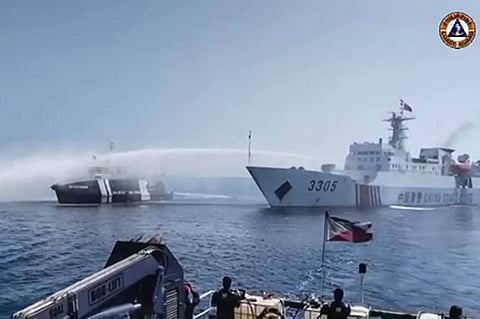
- NEWS
- the EDIT
- COMMENTARY
- BUSINESS
- LIFE
- SHOW
- ACTION
- GLOBAL GOALS
- SNAPS
- DYARYO TIRADA
- MORE

In a statement, Chinese Foreign Ministry Spokesperson Wang Wenbin once again insisted that "China has indisputable sovereignty over Nanhai Zhudao, consisting of Dongsha Qundao, Xisha Qundao, Zhongsha Qundao, and Nansha Qundao, and their adjacent waters, and has sovereign rights and jurisdiction over relevant waters."
Wang's sovereign claims in SCS overlap the Philippines' exclusive economic zone and territorial rights in the West Philippine Sea, including Bajo de Masinloc (Scarborough), which it calls Huangyan Dao or Huangyan Island.
Wang said the Arbitral Tribunal in the South China Sea Arbitration "violated the principle of state consent, exercised its jurisdiction ultra vires and rendered an award in disregard of the law."
China wants Manila and Beijing to "return to the right track of resolving maritime disputes through negotiation and consultation as soon as possible and work with China to safeguard peace and stability in the South China Sea."
On Saturday, Philippine allies called out China's most recent firing of water cannon against the Philippine vessels in the Bajo de Masinloc on Saturday morning.
It was described by United States Ambassador MaryKay Carlson as "aggressive and illegal."
In its water canon attack, the China Coast Guard targeted Datu Sanday, Datu Bankaw, and Datu Tamblot vessels of the Bureau of Fisheries and Aquatic Resources that were delivering oil subsidies and grocery packs to Filipino fishermen in the area.
Carlson said the BFAR ships were lawfully operating within the Philippine EEZ and that China's behavior "violates international law and endangers lives and livelihoods."
"We stand with our Philippine friends, partners, and allies in support of a free and open Indo-Pacific," she said.
Japanese Ambassador Kazuhiko Koshikawa likewise sounded the alarm over the use of water cannons and reiterated Japan's recognition of the 2016 arbitral ruling.
"Seriously concerned about the dangerous actions by CCG vessels against Philippine vessels, which endanger lives and livelihoods and pose the threat to the peace and stability in the South China Sea," he said on the social media platform, X.
Koshikawa said Japan reiterates "the importance of upholding international law, particularly UNCLOS and 2016 Arbitral Award."
Further, Canadian Ambassador David Hartman labeled China's actions as "dangerous and escalatory."
Hartman underscored that the 2016 ruling of the Permanent Court of Arbitration "is final and binding on the parties."
European Union Ambassador to the Philippines Luc Veron also condemned China's most recent aggression.
"The EU recalls that UNCLOS dispute settlement mechanisms contribute to maintaining and advancing the rule of law," he said.
"The 2016 UNCLOS Tribunal Award is legally binding and useful for peacefully resolving disputes. Water cannons aren't!" Veron said.
